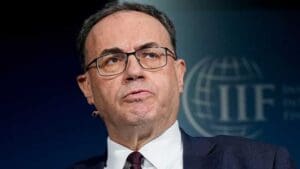Bank of England Governor Andrew Bailey has called on Sir Keir Starmer to go beyond the government’s recent EU “reset” deal and forge deeper trade and financial links with Brussels, warning that the economic fallout from Brexit and Donald Trump’s resurgent protectionism pose mounting risks to UK growth.
In a major speech delivered in Dublin, Mr Bailey welcomed the government’s latest agreement with the European Union, which reduces customs checks and aligns UK food standards with the bloc. But he said the deal did not go far enough to address the long-term economic challenges Britain faces.
“Just as the Windsor Agreement on trade involving the UK and Ireland was a welcome step forward, so too are the initiatives of the current UK Government to rebuild trade between the UK and EU,” he said. “But there is more we can do.”
Bailey was careful to avoid weighing in on the politics of Brexit, stating: “I take no position on Brexit per se.” However, he made clear that its economic consequences—particularly in the form of non-tariff barriers—have hurt productivity and overall growth.
“If the level of trade is lowered by some action, it will have an effect to reduce productivity growth and thus overall growth. Just as tariffs, by increasing the cost, can reduce the scale of trade, the same goes for the type of non-tariff barrier that Brexit has created,” he said.
“This does not mean that Brexit is wrong, because there can be other reasons for it, but it does suggest, I think powerfully, that we should do all we can to minimise negative effects on trade.”
The Governor’s remarks come as Starmer’s government faces mounting criticism over its EU strategy. The latest reset deal, which binds the UK to Brussels’ food safety standards and grants influence to the European Court of Justice, has been labelled “the worst of both worlds” by Brexiteers and some Labour backbenchers. Critics argue it sacrifices regulatory autonomy without restoring voting rights in EU institutions.
Bailey, however, pressed for deeper alignment—particularly in financial services—arguing it is crucial to ensure London’s role as a global capital market remains intact.
“The scale of investment needed requires access to global capital, supported by open financial markets,” he said. “There is merit in seeking to increase the openness of our financial markets by reducing non-tariff barriers.”
While defending global trade, Bailey also echoed parts of President Trump’s diagnosis of global economic dysfunction, describing international trade rules as under strain and in urgent need of repair.
He acknowledged that the former US president’s criticism of China’s industrial subsidies and “unsustainable trade imbalances” was not without merit.
“I am an unshaken believer in free trade, [but] the system has come under too much strain,” Bailey said. “It is incorrect to dismiss those who argue for restrictions on trade as just wrong-headed.”
He cited International Monetary Fund research that found China had implemented thousands of subsidy programmes across critical industries, skewing global markets and contributing to the erosion of fair trade principles.
While Bailey stopped short of endorsing Trump’s tariffs, he admitted they reflect deeper dysfunction in the multilateral trading system.
“If it is believed that tariff action is needed to create the shock and awe to get these issues on to the table and dealt with, then something has gone wrong with the multilateral system,” he said.
Nonetheless, the Governor warned against the UK and others turning inward.
“We must not retreat indiscriminately from global trade. The answer lies in diversifying supply chains among reliable partners who abide by international law,” Bailey concluded.
His speech is likely to add momentum to calls for a more pragmatic and economically focused post-Brexit policy, even as political divisions over the UK’s future relationship with Europe remain sharp.
Read more:
Bailey urges Starmer to deepen EU ties to soften Brexit blow and counter Trump tariffs

